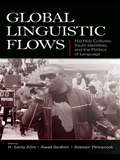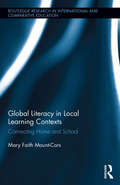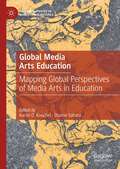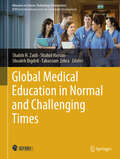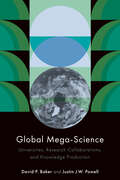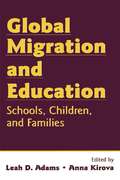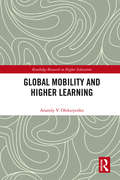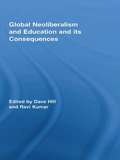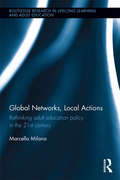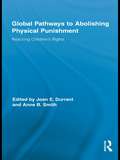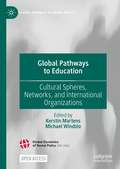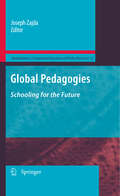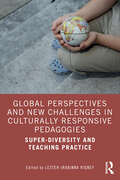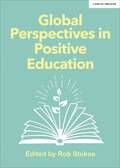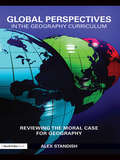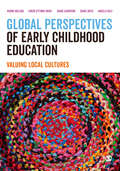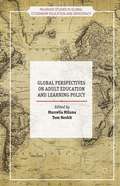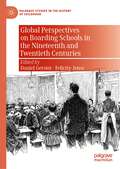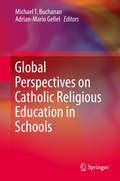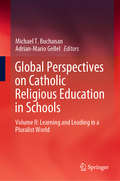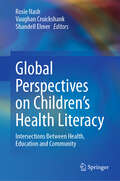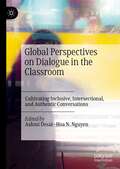- Table View
- List View
Global Linguistic Flows: Hip Hop Cultures, Youth Identities, and the Politics of Language
by Alastair Pennycook Awad Ibrahim H. Samy AlimLocated at the intersection of sociolinguistics and Hip Hop Studies, this cutting-edge book moves around the world – spanning Africa, Asia, Australia, the Americas and the European Union – to explore Hip Hop cultures, youth identities, the politics of language, and the simultaneous processes of globalization and localization. Focusing closely on language, these scholars of sociolinguistics, linguistic anthropology, cultural studies, and critical pedagogies offer linguistic insights to the growing scholarship on Hip Hop Culture, while reorienting their respective fields by paying closer attention to processes of globalization and localization. The book engages complex processes such as transnationalism, (im)migration, cultural flow, and diaspora in an effort to expand current theoretical approaches to language choice and agency, speech style and stylization, codeswitching and language mixing, crossing and sociolinguistic variation, and language use and globalization. Moving throughout the Global Hip Hop Nation, through scenes as diverse as Hong Kong’s urban center, Germany’s Mannheim inner-city district of Weststadt, the Brazilian favelas, the streets of Lagos and Dar es Salaam, and the hoods of the San Francisco Bay Area, this global intellectual cipha breaks new ground in the ethnographic study of language and popular culture.
Global Literacy in Local Learning Contexts: Connecting Home and School (Routledge Research in International and Comparative Education)
by Mary Faith Mount-CorsBased on qualitative research focused on literacy and health from three schools in coastal Kenya, this book examines country, school, and family contexts to develop a dual-generation maternal-child model for literacy learning and to connect local-specific phenomena with national and international policy arenas. In contrast to international development organizations’ educational policies and programs that tend to ignore literacy as a social practice within diverse contexts, the author unpacks the relationship between education and health, and the role of family and mothers in particular, highlighting how mothers are key actors in children’s literacy development and health outcomes.
Global Media Arts Education: Mapping Global Perspectives of Media Arts in Education (Palgrave Studies in Educational Futures)
by Aaron D. Knochel Osamu SaharaThis edited volume broadens the understanding of the media arts at a global scale bringing together practices and ideas from artists and art educators from around the world. Authors explore issues of cultural and social diversity in fields of education, media theory, and critical theories of education and pedagogy with particular attention to digital technologies' impact on visual arts learning. Researchers utilize a range of methodologies including participant-researcher ethnographies, action research, case study, and design based research. These artists and art educators share new research about the pedagogical and theoretical aspects of media arts in educational systems that are facing unprecedented change. This volume begins to map why and how experts are working within networked society and playing with digital innovations through media arts education as a critical and creative practice.
Global Medical Education in Normal and Challenging Times (Advances in Science, Technology & Innovation)
by Shabih H. Zaidi Shahid Hassan Shoaleh Bigdeli Tabassum ZehraThis book is written by several medical educators from developed as well as developing countries based on decades of experience in teaching. The unique experience gained during the COVID-19 pandemic has added new dimensions to the traditional pedagogy, andragogy, and heutagogy, documented here. The salient topics include distance learning, virtual classrooms, virtual workshops on OSCEs, open book exams, micro-learning, micro-credentialing, blended or digitalized curriculum delivery, academic leadership, communication skills, professionalism, telemedicine, bioethics, cyber clinics, artificial intelligence, etc. This book is used as a text or reference book by physicians, teachers, scholars, students, and medical universities for teachers' training, capacity building, and guidance on fundamental pillars of cognitive domains of knowledge, skills, and attitude, as well as factual, conceptual, procedural, and metacognitive skills. It is also a source of guidance in faculty enhancement and toward continued quality improvement in medical education.
Global Mega-Science: Universities, Research Collaborations, and Knowledge Production
by David P. Baker Justin J.W. PowellNever has the world been as rich in scientific knowledge as it is today. But what are its main sources? In accessible and engaging fashion, Global Mega-Science examines the origins of this unprecedented growth of knowledge production over the past hundred and twenty years. David P. Baker and Justin J.W. Powell integrate sociological and historical approaches with unique scientometric data to argue that at the heart of this phenomenon is the unparalleled cultural success of universities and their connection to science: the university-science model. Considering why science is so deeply linked to (higher) educational development, the authors analyze the accumulation of capacity to produce research—and demonstrate how the university facilitates the emerging knowledge society. The age of global mega-science was built on the symbiotic relationship between higher education and science, especially the worldwide research collaborations among networked university-based scientists. These relationships are key for scholars and citizens to understand the past, future, and sustainability of science.
Global Migration and Education: Schools, Children, and Families
by Anna Kirova Leah AdamsGlobal Migration and Education makes a notable contribution to understanding the issues faced by immigrant children, their parents, and educators as they interact in school settings, and to identifying the common challenges to, and successes in, educational institutions worldwide as they cope with these issues. Global in scope, there are chapters f
Global Mobility and Higher Learning (Routledge Research in Higher Education)
by Anatoly OleksiyenkoThis book examines learning-mobility tensions and ties caused by convergences and divergences of social, organizational and cognitive forces in global higher education. As some of these forces generate status anxiety, and others enhanced self-worth, this volume asks the questions: How can students navigate treacherous education markets to reduce the former and increase the latter? Which specific forces and confluences enhance the quality of self-discovery? Does the search for identity and meaning produce better results when conducted internationally? Which transformative drivers of global mobility enhance social mobility? What allows some students to gain the capacity for impactful higher learning at a time when others lose it? Why are strategically minded students increasingly concerned about equality and the quality of contribution to the common good of education, rather than about their own status? What makes some places of learning stand out when students recount their journeys of self-discovery and roads to self-worth? This book includes a broad range of stories and firsthand perspectives that are often overlooked in the process of internationalization of higher education. The narratives offer important insights to consider, given the ever-increasing disquiets of competitiveness-oriented global higher education.
Global Neoliberalism and Education and its Consequences (Routledge Studies in Education, Neoliberalism, and Marxism)
by Dave Hill Ravi KumarIn this groundbreaking critique of neoliberalism in schooling and education, an international cast of education policy analysts, educational activists and scholars deftly analyze the ideologies underlying the global, national and local neoliberalisation of schooling and education. The thrilling scholarship that makes up Global Neoliberalism and Education and its Consequences exposes the machinations, agenda and impacts of the privatising and 'merchandisation' of education by the World Bank, the General Agreement on Trade in Services (GATS), biased think tanks, global and national corporations and capital, and the full political spectrum of Neoliberal governments. Including such topics as the increasing polarization of racialized and gendered social classes as a consequence of neoliberal policies, the role and shape of markets and education in the era of globalised Capitalism, the effects of the profit motive in higher education, the impact of the Heritage Foundation in the USA, and even a critical evaluation of education in Cuba--readers are sure to find startling insight and provocative arguments throughout Global Neoliberalism and Education and its Consequences.
Global Networks, Local Actions: Rethinking adult education policy in the 21st century (Routledge Research in Lifelong Learning and Adult Education)
by Marcella MilanaGlobal Networks, Local Actions: Rethinking adult education policy in the 21st century examines public policy developments in adult education, exploring the policy framing of adult education practice in a range of socio-cultural contexts, and contributing to the development of policy research from global and comparative perspectives. Drawing from multidisciplinary fields such as adult education, comparative and international education, and sociology, chapters analyse empirically grounded studies from the US, Italy, Argentina and Brazil. Each study helps to identify how political agents interact at international, regional, national and local scales, and what the implications are for publically-funded interventions in adult education. While this book recognises the complexity of adult education policy, it argues for the need to deconstruct the false belief that what is global in adult education may be intrinsically distinct from the characteristics of geographical or social territories in which adult education occurs. Instead, it points to localised norms and ideas on Adult Basic and Secondary Education as ultimately contained in, and constituting, what is at times perceived as global, or abstracted from definite geographical or social territories. This book calls for a global sociology of adult education in response to global challenges, and makes an important contribution to our understanding of developments in public adult education policy. As such, it will be of key interest to researchers, academics and postgraduate students in the fields of adult education, comparative and international education, education policy and politics, sociology of education, and global studies.
Global Pathways to Abolishing Physical Punishment: Realizing Children’s Rights (Routledge Research in Education)
by Anne B. Smith Joan E. DurrantThis book describes the unfolding of a global phenomenon: the legal prohibition of physical punishment of children. Until thirty years ago, this near-universal practice was considered appropriate, necessary and a parental right. But a paradigm shift in conceptions of childhood has led to a global movement to redefine it as violence and as a violation of children’s rights. Today, many countries have prohibited it in all settings, including the home. This remarkable shift reflects profound cultural changes in thinking about children and their development, parent-child relationships, and the role of the state in family life. It has involved actors in many sectors, including academia, government, non-governmental organizations and children themselves. Documenting the stories of countries that have either prohibited corporal punishment of children or who are moving in that direction, this volume will serve as a sourcebook for scholars and advocates around the world who are interested in the many dimensions of physical punishment and its elimination.
Global Pathways to Education: Cultural Spheres, Networks, and International Organizations (Global Dynamics of Social Policy)
by Kerstin Martens Michael WindzioIn this open access volume, the editors identify the trajectories and patterns displayed by education systems and investigate the causes of change from a global and historical perspective. The contributors argue that the emergence and development of education systems can be traced back to inherent national factors, as well as to the international diffusion of ideas.The research presented in this volume is a wide-ranging analysis and explanation of the dynamics of emergence, diffusion, and change in relation to state education systems. The chapters offer an empirical investigation into whether the global diffusion of Western-rational educational content and organizational forms occurs as expected by neoinstitutionalist theory, or whether culturally specific developmental paths dominate in different parts of the world.The book will be of interest to students and researchers in various social science disciplines, including social policy, education, sociology, political science, international relations, organizational theory, and economics.
Global Pedagogies
by Joseph ZajdaGlobal Pedagogies: Schooling for the Future, which is the twelfth volume in the 12-volume book series Globalisation, Comparative Education and Policy Research, presents scholarly research on major discourses in comparative education research with reference to globalisation, educational policy and classroom pedagogy. It is a sourcebook of ideas for researchers, practitioners and policy makers in education, globalisation, global pedagogies and schooling for the future around the world. The aim of the book is to provide an easily accessible, practical yet scholarly source of information about the international concern in the field of globalisation, global pedagogies, and educational transformation. Readers will find here the very latest thinking on globalisation, global pedagogies and educational transformation in the context of global culture. It offers a timely overview of current issues affecting discourses pertaining to global pedagogies and policy research in the global culture. It provides directions in education, and policy research, relevant to transformational educational reforms in the 21st century. The book critically examines the overall interplay between comparative education discourses, globalisation, and education. It draws upon recent studies in the areas of globalisation, equity, social justice, and the role of the State. It explores conceptual frameworks and methodological approaches applicable in the research covering the State, globalisation, equity, and education. It demonstrates the neo-liberal ideological imperatives of education and policy reforms, and illustrates the way the relationship between the State and education policy affects current models and trends in education reforms and schooling globally. Various book chapters critique the dominant discourses and debates pertaining to comparative education discourses and the newly constructed and re-invented models of neo-liberal ideology in education. Using a number of diverse paradigms in comparative education research, ranging from critical theory to globalisation, the authors, by focusing on globalisation, ideology and democracy, attempt to examine critically both the reasons and outcomes of education reforms, policy change and transformation and provide a more informed critique on the Western-driven models of accountability, quality and school effectiveness. The book draws upon recent studies in the areas of equity, cultural capital and dominant ideologies in education.
Global Perspectives and New Challenges in Culturally Responsive Pedagogies: Super-diversity and Teaching Practice
by Lester-Irabinna RigneyLed by Professor Lester-Irabinna Rigney, Global Perspectives and New Challenges in Culturally Responsive Pedagogies brings together diverse communities of education research in an innovative way to develop a nuanced understanding of the relationship between education and democracy. This book synthesises a range of theoretical, conceptual, and empirical approaches to address the complex challenges faced by young people and societies in the 21st century. Each chapter provides accounts of local inclusive encounters in education, while engaging with global debates and issues, such as racism, neoliberalism, de-colonisation, new colonialism, de-democratisation, and growing social, economic, and educational inequality. This book presents new ways of thinking about democracy, local–global enactments of culturally responsive pedagogies through teaching and learning, and future thinking for a new era. Bringing together diverse, Australian, and international perspectives, this book will be relevant to educators, researchers, and policy makers who are interested in Indigenous education, educational sociology, de-coloniality, cultural safety, critical pedagogy, and education leadership theory.
Global Perspectives for Local Action: Using TIMSS to Improve U.S. Mathematics and Science Education
by National Research CouncilThe Third International Mathematics and Science Study (TIMSS) raised the alarm about U.S. mathematics and science education. Most Americans are now aware that U.S. students lag behind their peers in other developed nations. In one state, the legislature reacted by lengthening the school year, assuming that more time on academic content would boost student performance. Some educators have fixed the blame on the mathematics and science curricula typically used in U.S. schools.Does the problem lie in the curricula, instruction, or the system of support available to teachers? This book presents the first comprehensive analysis of TIMSS study--a half-million students from 15,000 schools around the world. It presents detailed reports on three major aspects of education, including curriculum issues, teaching practices, and school support.
Global Perspectives in Positive Education
by Rob StokoeThe common goal of the contributing authors in this publication is to engage, learn from and share success in order to energise the positive education movement for the benefit of our young people. This is the greatest contribution we can make to the future of our global society and the wellbeing of its citizens. We all seek to offer to everyone the potential to achieve success, to be purposeful and content, contributing positively to their own wellbeing and that of others. Presenting at conferences across Australia, Singapore, Dubai and the UK has offered a unique insight in to the breadth and quality of Positive Education globally. The positive education community encompasses a dedicated and selfless group of individuals researchers, practitioners and leaders who are doing great things to help more young people to grow as robust individuals and learners. Yet all too often we fail to join the dots, to connect the passion and expertise of our global community, to share the best of what we do and what we think.Sharing are expertise, passion and enthusiasm is essential if we are to truly support our young people. The International Positive Education Network (IPEN) was established in 204 to promote these values and sharing of insight and expertise. Its mission being to promote academics alongside character and wellbeing, to connect people and to share best practice worldwide.The commitment to these values are exemplified by the writers who have kindly offered their expertise for the good of others, from Dr Helen Street, Australia, to Yukun Zhao in China and Professor Leonid Illushin in Russia. Other chapters have come from Dr. Abdullah Al Karam, KHDA, Dubai, Professor Andrew Martin, Australia and Amba Brown in Singapore.
Global Perspectives in Positive Education
by Rob StokoeThe common goal of the contributing authors in this publication is to engage, learn from and share success in order to energise the positive education movement for the benefit of our young people. This is the greatest contribution we can make to the future of our global society and the wellbeing of its citizens. We all seek to offer to everyone the potential to achieve success, to be purposeful and content, contributing positively to their own wellbeing and that of others. Presenting at conferences across Australia, Singapore, Dubai and the UK has offered a unique insight in to the breadth and quality of Positive Education globally. The positive education community encompasses a dedicated and selfless group of individuals researchers, practitioners and leaders who are doing great things to help more young people to grow as robust individuals and learners. Yet all too often we fail to join the dots, to connect the passion and expertise of our global community, to share the best of what we do and what we think.Sharing are expertise, passion and enthusiasm is essential if we are to truly support our young people. The International Positive Education Network (IPEN) was established in 204 to promote these values and sharing of insight and expertise. Its mission being to promote academics alongside character and wellbeing, to connect people and to share best practice worldwide.The commitment to these values are exemplified by the writers who have kindly offered their expertise for the good of others, from Dr Helen Street, Australia, to Yukun Zhao in China and Professor Leonid Illushin in Russia. Other chapters have come from Dr. Abdullah Al Karam, KHDA, Dubai, Professor Andrew Martin, Australia and Amba Brown in Singapore.
Global Perspectives in the Geography Curriculum: Reviewing the Moral Case for Geography
by Alex Standish‘For geographers across the globe this book provides the arguments for a return to the teaching of geography and why they should reject the politicisation of the subject by education policy makers and politicians. Standish’s careful critique shows the necessity of a depoliticised geography curriculum the irony of which would be that it would ensure that every child could point to Iraq, Iran and Afghanistan on a map.’ Prof. Dennis Hayes – Oxford Brookes University, UK 'A prescient and critical analysis of the changing face of geographyteaching. This book deserves to be widely read and debated. Alex Standish's book puts current trends in geography teaching in historical and critical context. It comprises a forthright and timely defence of geographical education for its own sake.' Dr Jim Butcher, FRSA, Department of Sport Science, Tourism and Leisure, Canterbury Christ Church University. Since the early 1990s, educational policy makers and some subject leaders have been seeking to fundamentally change the teaching of geography in UK and US schools, from a subject which encourages students to explore spatial concepts, ideas and skills, to a more ethics based subject concerned with the promotion of environmentalism, cultural diversity and social justice. In this book the new approach is critically examined, within a historical and ideological context, addressing a number of fundamental questions: Should geography be used as a tool for the delivery of citizenship ideals? How does this affect the intellectual and moral value of geographical education for young people? If the state and teachers are taking more responsibility for the values, attitudes and emotional responses of students, how will they learn to develop these qualities for themselves? If global perspectives shift the focus of education from learning about the outside world to learning about the self, what is its vision of social progress and conception of social change? This book advocates a return to liberal models of education, arguing that the new approach to geography currently being promoted for schools fundamentally undermines the educational value of the subject, and the freedom of young people to shape the world in which they live. A vital resource for teachers and student teachers alike, Global Perspectives in the Geography Curriculum makes a significant contribution to the growing debate about the future direction of the discipline itself.
Global Perspectives of Early Childhood Education: Valuing Local Cultures
by Angela Daly Diane Boyd Naomi McLeod Diane Garrison Emem Effiong OkonThis text offers students rich local cultural examples of Early Childhood Education from around the world. Informed by first-hand research and practice, the book provides authentic snapshots of ECE from countries, including Afghanistan, Australia, Ghana, Nigeria, Brazil, Eswatini, Mongolia, Nepal, Sami children of Finland, and Syrian refugee children, enabling readers to better understand the wider determinants influencing the multiplicity and diversity of children’s daily experiences. With expert contributors drawn from across the world, this book is essential reading for those interested in global perspectives on early childhood. Dr Naomi McLeod is a Senior Lecturer in Early Childhood Education at Liverpool John Moores University. Dr Emem E.Okon develops professional development programmes for educational practitioners in Nigeria. Diane Garrison is an anti-racist, educator, leader and community mentor. Dr Diane Boyd is a Senior Lecturer in Early Childhood Education at Liverpool John Moores University. Dr Angela Daly is a Reader in Education and Global Learning at Liverpool John Moores University.
Global Perspectives of Early Childhood Education: Valuing Local Cultures
by Angela Daly Diane Boyd Naomi McLeod Diane Garrison Emem Effiong OkonThis text offers students rich local cultural examples of Early Childhood Education from around the world. Informed by first-hand research and practice, the book provides authentic snapshots of ECE from countries, including Afghanistan, Australia, Ghana, Nigeria, Brazil, Eswatini, Mongolia, Nepal, Sami children of Finland, and Syrian refugee children, enabling readers to better understand the wider determinants influencing the multiplicity and diversity of children’s daily experiences. With expert contributors drawn from across the world, this book is essential reading for those interested in global perspectives on early childhood. Dr Naomi McLeod is a Senior Lecturer in Early Childhood Education at Liverpool John Moores University. Dr Emem E.Okon develops professional development programmes for educational practitioners in Nigeria. Diane Garrison is an anti-racist, educator, leader and community mentor. Dr Diane Boyd is a Senior Lecturer in Early Childhood Education at Liverpool John Moores University. Dr Angela Daly is a Reader in Education and Global Learning at Liverpool John Moores University.
Global Perspectives on Adult Education and Learning Policy
by Tom Nesbit Marcella MilanaThe worldwide appearance and expression of adult education and lifelong learning have changed significantly during the past 20 years. This book explores recent changes in their related national and international policies, how they intersect with developments in higher education and how they may contribute to debates on citizenship and democracy.
Global Perspectives on Boarding Schools in the Nineteenth and Twentieth Centuries (Palgrave Studies in the History of Childhood)
by Felicity Jensz Daniel GersterIn the nineteenth and twentieth centuries, thousands of pupils attended boarding schools in various places across the globe. Their experiences were vastly different, yet they all had in common that they were separated from their families and childhood friends for a period of time in order to sleep, eat, learn and move within the limited spatial sites of the boarding school. This book frames these ‘boarding schools’ as a global and transcultural phenomenon that is part of larger political and social developments of European imperialism, the Cold War, and independence movements. Drawing together case studies from colonial South Africa, colonial India, Dutch Indonesia, early twentieth-century Nigeria, Fascist Spain, Ghana, Nazi Germany, nineteenth-century Ireland, North America and the Soviet Union, this edited collection examines the ways in which boarding schools extracted pupils from their original social background in order to train, mold and shape them so that they could fit into the perceived position in broader society. The book makes the broader argument that framing boarding schools as a global phenomenon is imperative for a deepened understanding of the global and transnational networks that linked people as well as ideas and practices of education and childhood in the nineteenth and twentieth centuries.
Global Perspectives on Catholic Religious Education in Schools
by Michael T. Buchanan Adrian-Mario GellelThis book covers theoretical aspects of Catholic Religious Education in schools and examines them from multiple theoretical and contextual perspectives. It captures the contemporary academic and educational developments in the field of Religious Education while discussing in detail the challenges that Religious Educators face in different European, Asian, African, Australian, American and Latin American countries. The edited collection investigates how to pass on a Catholic heritage as a "living tradition" in diversely populated schools and communities. In this way it explores and asserts the proper identity of Catholic Religious Education in dialogue with Catechetics and with the wider discipline of Religious Education. As the different articles of this publication demonstrate - through a series of interesting and critical points of view - Catholic Religious Education is confronted with many challenges from the risk of marginalization to the confusion produced by a religious indifferentism leading to a strictly comparative or neutral method in the study of religions. It is essential to take into account in our research perspectives that Catholic Religious Education is not only a subject but also a mission in the light of the diakonia of truth in the midst of humanity H. E. Cardinal Zenon Grocholewski, Prefect, Congregation for Catholic Education, Holy See, Vatican City Religious education teachers cannot by themselves overcome the ills of society, but religious education. . . can help to create better citizens of the world as some authors argue throughout this collection. could not ask more from such timely and provocative collection. It is a gift to the profession and to Catholic Religious Education. Prof. Gloria Durka, Fordham University, New York, NY, USA
Global Perspectives on Catholic Religious Education in Schools: Volume II: Learning and Leading in a Pluralist World
by Michael T. Buchanan Adrian-Mario GellelThis book shares global perspectives on Catholic religious education in schools, chiefly focusing on educational and curriculum issues that take into account the theology and the pedagogy which support learning in connection with Catholic religious education. Further, it offers insights into the distinctive contribution that Catholic religious education makes to religious education and education in general across diverse schooling contexts. Bringing together insights from leading scholars and experts on Catholic religious education around the globe, the book offers an essential reference guide for all those involved in researching, planning and designing curricula for Catholic religious education, as well as developing related theories in the field.
Global Perspectives on Children's Health Literacy: Intersections Between Health, Education and Community
by Rosie Nash Vaughan Cruickshank Shandell ElmerThis book examines global perspectives of health literacy development to explore the intersections between health, education, and community settings. International health literacy experts provide a collection of important insights and recommendations that are urgently required to inform practice and policy. The impetus for this book is a growing recognition that a siloed approach to supporting health and health literacy exists in many countries. This book addresses a gap in the international literature by presenting solutions that promote ongoing collaboration across settings to redress inequity and optimize global health. Identifying intersections between the settings is critically important to supporting these collaborations. Health literacy is the ability to find, use, evaluate and apply information to look after our health. Developing the personal asset of health literacy earlier in life influences adult health behaviours. A Health in All Policies approach has been globally endorsed; however, a health literacy in all settings approach is yet to be realised. As a social determinant of health, health literacy can determine health outcomes, educational attainment, social equity, and productivity. The authors investigate the health literacy development of children and their communities within particular regions, exploring whether health literacy is addressed as a health, education or community issue. They describe where silos exist between and within settings, aiming to highlight areas where health literacy is present. This helps identify challenges and opportunities for optimizing health literacy development. Global Perspectives on Children's Health Literacy is essential reading for public health and health promotion researchers and practitioners, primordial prevention researchers, policy makers, health and education ministers, community service ministers, youth organisations, librarians, school teachers, health and physical education teachers, school nurses, child and parenting services nurses, paediatricians, and allied health professionals who work with children and families (e.g., social workers, speech pathologists, dietitians).
Global Perspectives on Dialogue in the Classroom: Cultivating Inclusive, Intersectional, and Authentic Conversations
by Ashmi Desai Hoa N. NguyenThis book explores globally-informed, culturally-rooted approaches to dialogue in the classroom. It seeks to fill gaps in communication and education literature related to decolonizing dialogue and breaking binaries by decentering Eurocentric perspectives and providing space for dialogic practices grounded in cultural wealth of students and teachers. We first describe the book’s genesis, contextualize dialogue within the global impact of the COVID-19 pandemic, and share guiding concepts of inclusion, intersectionality, and authenticity in dialogue and pedagogy. We also distinguish dialogue from other practices and times in which dialogue may not be possible. The book brings fresh and urgent perspectives from authors across different disciplines, including ceramics, religious studies, cultural studies, communication, family therapy, and conflict resolution. The chapters distill the idea of dialogue within contexts like a bible circle, university sculpture studio, trauma and peacebuilding program, and connect dialogue to teaching, learning, and emerging ideas of power disruption, in-betweenness, and relationality.
